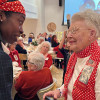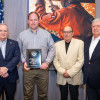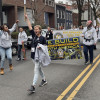Thirty-one Boilermaker dependents earn awards totaling $50,000
THE BOILERMAKERS’ International Executive Council scholarship committee announced the winners of its 2015 scholarship program this past April. The committee awarded $50,000 to 31 recipients, with $38,000 being allocated to U.S. applicants and $12,000 to Canadian applicants.
The one-year grants included three $3,000 awards, 13 $2,000 awards, and 15 $1,000 awards. The committee selected scholarship recipients from a pool of Boilermaker dependents in their senior year of high school. Applicants were judged on their academic achievements, leadership skills, participation in extracurricular activities, and performance on a 300-500-word essay.
Three receive top $3,000 award

Abigail Nicole Burke, daughter of Local 374 (Hammond, Ind.) member Sean Burke, is a graduate of Chesterton High School in Chesterton, Ind. She is attending Harvard University, where she plans on studying history and constitutional law.
Read Essay

Hayden Douglas Flinner, son of Local 105 (Piketon, Ohio) member Doug Flinner, is a graduate of Gallia Academy in Gallipolis, Ohio. He is attending Georgia Institute of Technology where he will pursue a degree in computer science.
Read Essay

Joshua Michael Henry, son of Local 1393 (Altoona, Penn.) member Dale Henry, graduated from Altoona Area Senior High School in Altoona. He is attending Penn State University, where he will pursue coursework in biomedical engineering and immunology and later hopes to go on to earn a doctorate at Johns Hopkins University or Duke University.
Read Essay
Thirteen receive $2,000 awards

Morgan Ellice Baird, daughter of Local D209 (Charlestown, Ind.) member Matthew Baird, graduated from New Washington High School in New Washington, Ind. She is attending Purdue University, where she is studying chemistry and biology and plans to attend medical school and specialize in neurosurgery.

Madeline Elsa Copeland, daughter of Local 363 (East St. Louis, Ill.) member Dwayne Copeland, is a graduate of Marquette Catholic High School in Alton, Ill. She is attending Lewis and Clark Community College and pursuing studies in nursing.

Andrew Thomas Fritz, son of Local 647 (Minneapolis, Minn.) member Brian Fritz, graduated from St. Fran- cis High School in St. Francis, Minn. He is attending The University of Minnesota and taking coursework in mechanical engineering.

Catherine Rose Keeling, daughter of Local 169 (Detroit, Mich.) member Harley Keeling, graduated from Hartland High School in Hartland, Mich. She is attend- ing The University of Michi- gan and studying biology. She hopes to pursue a career in the medical field.

Jacob Anthony Akers LaMar, son of Local 374 (Hammond, Ind.) member Gabriel LaMar, graduated from Castle High School in Newburgh, Ind. He is attending Indiana University and studying engineering and construction. He hopes to explore ways to make coal-fired generating plants more efficient.

Taylor Joanne Lang, daughter of Local 532 (Regina, Saskatchewan) member Scott Lang, is a graduate of Dr. Martin LeBoldus Catholic High School in Regina. She is attending the University of Victoria, where she will pursue course work in bio-medical engineering.

Robert Lis, son of Local 5, Zone 5 (Floral Park, N.Y.) member Darius Lis, graduated from Hendricks High School in New Hyde Park, N.Y. He is studying biology at Fordham University and plans a career in cardiology & surgery.

Austin “Cody” MacDonald, son of Local 73 (Saint John, New Brunswick) member Roderick “Chad” MacDonald, is a graduate of Northumberland Regional High School in Alma, Nova Scotia. He is attending Dalhousie University in Halifax, Nova Scotia, where he will pursue coursework in medical sciences and biology.

Josie Sophie Maillet, daughter of Local 73 (Saint John, New Brunswick) member Gilles Maillet, is a graduate of Ecole Clement-Cormier High School in Bourtouche, New Brunswick. She is attending University de Moncton, campus De Moncton, where she plans to study medicine.

Kelsey Anne O’Brien, daughter of Local 5 (Floral Park, N.Y.) member Kevin O’Brien, graduated from Commack High School in Commack, N.Y. She is attending High Point University in North Carolina, pursuing studies in international relations with a minor in education.

Christopher Rura, son of Local 1393 (Altoona, Penn.) member Edward Rura, graduated from Homer Center High School in Homer City, Penn. He is attending Villanova University near Philadelphia, where he is studying astrophysics. He hopes to secure a career with NASA and participate in space exploration or research on the International Space Station.

Jessica Elizabeth Strenth, daughter of Local 108 (Birmingham, Ala.) member John Edward Strenth III, graduated from Saraland High School in Saraland, Ala. She is attending the University of Mobile and is pursuing course-work in psychology and worship leadership with intentions of becoming a marriage and family therapist. Jessica also received a $1,000 scholarship from Union Plus.

Curtis Wade Wentz, son of Local 1393 (Altoona, Penn.) member Dale Wentz, graduated from Tussey Mountain Sr. High School in Saxton, Penn. He is attending Juniata College and pursuing coursework in pre-radiology science.
Committee selects 15 $1,000 winners

Allison Grace Bachand-Lapointe, daughter of Local 146 (Edmonton, Alberta) member Ken Bachand, is a graduate of Archbishop Oscar Romero High School in Edmonton. She is attending MacEwan University in Edmonton and plans to pursue coursework in business.

Daniel Jason Boutilier, son of Local 73 (Saint John New Brunswick) member Daniel Roy Boutilier, is a graduate of Glace Bay High School in Glace Bay, Nova Scotia. He is attending Nova Scotia Community College and taking courses in the welding trade. He plans to become a Boilermaker.

Andrew Loren Cessna, son of Local 744 (Cleveland, Ohio) member James Cessna, graduated from Boardman High School in Youngstown, Ohio. He is attending Ohio State University and participating in the NROTC unit while studying mechanical engineering. Afterwards, he plans to join the Navy.
Chelsea Catherine Costello, daughter of Local 146 (Edmonton, Alberta) member Ian Costello, is a graduate of Ron- calli Central High School in Avondale, Newfoundland. She plans to pursue coursework in primary/elementary education. Her final college selection was not avail- able at press time.

Shyann Marie Hartline, daughter of Local 656 (Chattanooga, Tenn.) member Travis Hartline, graduated from North Sand Mountain High School in Higdon, Ala. She is attending The University of Alabama at Birmingham, where she will pursue a medical degree, with plans to become a surgeon.

Andrea Nicole Hennessey, daughter of Local 580 (Middle Sackville, Nova Scotia) member Kenny Hennessey, is a graduate of Sir John A. Macdonald High School in Upper Tantallon, Nova Scotia. She is attending St. Francis Xavier University in Antigonish, Nova Scotia, and pursuing a Bachelor of Science degree in nursing.

Melissa Marie Larade, daughter of Local 73 (Saint John, New Brunswick) member Mark Larade, is a graduate of Ecole NDA in Cheticamp, Nova Scotia. She is attending St. Francis Xavier University and pursing a Bachelor of Science degree in nursing.

Hailey Jade Maidment, daughter of Local 73 (Saint John, New Brunswick) member Dean Maidment, is a graduate of Saint John High School in Saint John, New Brunswick. She is attending Mount Allison University in Sackville, New Brunswick, where she plans to pursue coursework in medicine, specializing in pediatrics.

John Wyatt Retkowski, son of Local 13 (Philadelphia) member Joseph B. Retkowski, graduated from Gloucester County Christian School. He is attending Grove City College, where he will study mechanical engineering, with emphasis on 3D modeling and design for manufacturing.

Megan Elizabeth Robison, daughter of Local D533 (Hagerstown, Md.) member Eric Robison, graduated from Hedgesville High School in Hedgesville, W.Va. She is attending West Virginia Honors College and pursuing coursework in special education.

Hannah Ellen Scherer, daughter of Local 158 (Peoria, Ill.) member Brian Scherer, graduated from Illinois Valley Central High in Chillicothe, Ill. She is attending Lakeland College and seeking a degree in business management or marketing.
Megan Ashley Sheerin, daughter of Local 344 (Ridgecrest, Calif.) member Daniel Sheerin, graduated from Lemoore Middle College High School in Lemoore, Calif. She is attending California State University in Chico and plans to become a registered nurse.

Dillon Paul Stanhope, son of Local 397 (Kunkletown, Penn.) member Dennis Stanhope, graduated from Pleasant Valley High School in Brodheadsville, Penn. He is attending Penn State University and pursuing a degree in engineering.

Casey Alexander White, son of Local 105 (Piketon, Ohio) member Kevin White, graduated from Wheelersburg High School in Wheelersburg, Ohio. He is attending the University of Rio Grande and pursuing a degree in data science.

Savannah Victoria Williamson, daughter of Local 108 (Birmingham, Ala.) member Timothy Williamson, graduated from Pike Liberal Arts in Troy, Ala. She is attending Auburn University and taking coursework in pre-med. She hopes to become a doctor.
The Power of Social Media
by Abigail Nicole Burke
On March 10, 2011, I stood with thousands of union members in front of the Indiana Statehouse to protest the newly proposed Right to Work Legislation. The legislation contained measures meant to drive unions from the workplace by eliminating union dues. At the rally, union leaders estimated that nearly 25,000 people had come to protest the bill. However, the next day I was shocked to see that the news reported only 8,000 protesters had been at the statehouse. Although I was upset at seeing such a misrepresentation in the news, at the time I had no way to let people know what had actually happened.
Today, with only a small status update, I could voice my concerns on Facebook and have them reach over a hundred people. Groups ranging from activists in the Arab Spring to supporters of ALS victims have already harnessed the power of social media for good causes. In particular, activists utilize social media for three main reasons: it is cheap, it is far-reaching, and it is very fast. These three aspects of social media would be largely beneficial to union members as well. With little to no cost of social media, unions could send large-scale messages to their members in a very short period of time. In terms of protesting, unions could use even use social media to raise awareness for their cause. For example, one of my friends jokingly referred to the Right to Work legislation as "Right to Work for Less". His comment was a small joke, but tweeting a short phrase like that can quickly make people aware of pertinent issues and raise support for a cause.
For the past ten years, I have watched my dad lead monthly union meetings, union picnics and functions, and protests against the anti-union movement. Watching all this, I have realized that the essential power of unions comes with organization. Unions can only work if their members act as one cohesive unit, and social media is one way for unions to increase their level of organization. With the prevalence of smartphones in society, many union members would be able to receive notifications on their phone of upcoming union events and meetings. For new members, this would be especially important, as they are trying to integrate into their union. Having a social network of union employees could also help new members connect and form relationships with the other people in their local. In school, I have often contacted people over Facebook when I do not know them well enough to have their phone number. Being able to easily contact someone to ask their help or simply how they are doing is a simple way to form a deeper relationship. For retired members trying to connect with old co-workers, a union Facebook group would allow them to contact the people they used to work with. Overall, Twitter and Facebook would allow unions to quickly remind their members of important dates, spread awareness for union causes, and help new and old members keep in contact with their union brothers and sisters.
2015 Scholarship Essay
by Hayden Douglas Flinner
Unions could use social media in a number of helpful ways to organize new members and service their current members. Twitter and Facebook are especially powerful social platforms because of how widely used they are. Especially important, in my opinion, is garnering the support of the millennials who fill most of these social platforms' population. They are the future source of public opinion, and it is very important to the future success of union actions to get this demographic on board.
Twitter, in its current form, is a very genuine place. It is the place where teenagers go to voice the controversial opinions that they do not want their parents to see on Facebook. It is the place where professional sports athletes get into petty insult wars with random hecklers. Having a strong and supported presence on Twitter would be of great benefit to a union's public image. The average Twitter user is a young adult living in an urban area. The average Twitter user is someone who was not around for the workplace abuses that spawned unions, and someone who likely does not work in a profession that has a powerful union. Regardless, this "average" person's opinion on a union should be considered very important. This is the same young demographic that voted our current President into office, twice.
The way that a union wins over this demographic is very simple. It starts with having a bit of a following, many of whom are probably the children of union workers. Once a few popular members of this demographic are following a union's account, the union must capitalize on this opportunity by posting things that appeal to this crowd. For example, directly attacking senators who push for a higher minimum wage is not likely to be a popular move among Twitter users. While it may be a popular opinion amongst a union's members, those people are likely not on Twitter. Instead, a great opportunity would have been to send out a tweet during the Occupy Wall Street protests in 2011. Tweeting a remark about how unions protect the common worker and prevent income inequality with the hashtag #OccupyWallStreet would have likely exploded the union's presence on Twitter. A single two-or-three-sentence remark could have been seen by millions of politically minded young Americans. This group is the future source of public opinion in our country, and they would be a lot more sympathetic to union causes in the future if they had seen that the union is in line with their political interests. It would have been a sure way to not only gain new members but also help support current members by reminding young Americans why we have unions to begin with. In the modem world of social networks, opportunities like this to advance a union's brand cannot be overlooked.
Facebook is also a great tool for acquiring new members, but it is not as effective as Twitter because people are less likely to share politically charged or divisive posts. Facebook, however, is a wonderful tool for servicing current members. It can help in small but useful ways. For example, a Facebook event could be created for an upcoming union charity golf tournament. Since almost everyone logs into Facebook regularly or at least has a member of their family whom does so, a little notification on their account reminding them about an upcoming union function could be the difference between them showing up and them forgetting about it.
Another, more powerful, approach would be targeted advertising on services like Facebook and Twitter. Both of these networks allow you to post advertisements to accounts that meet certain criteria, such as someone who seems to be working in a union's industry or someone who lives in a specific location. These advertisements could feature the many benefits of joining a union, such as higher pay, much higher job security, etc. Advertisements like these do not cost much because they are narrowed down to so few people, but they are highly effective due to how targeted they are. They could also be used during union protests to show Tweets to people driving near protests, explaining what is going on and rallying them to support the union cause as well. Targeted advertising is an unbelievably powerful tool that social media provides.
I hope that I have summarized effectively a few of the ways unions could use social networks to service their current members and organize new members. If used correctly, unions could grow into something millennials promote and support without ever really having a personal reason to. They would understand that unions are helpful organizations that keep corporations from becoming too powerful, and support them as such. I think that using social networks in this way is imperative to the future effectiveness of unions.
2015 International Brotherhood of Boilermakers, Iron Ship Builders, Blacksmiths, Forgers and Helpers Scholarship Essay
by Joshua Henry
Social media lends itself to the practice of mass, widespread communication among groups of people. More than a billion people worldwide use social media. Specifically, social media is a website or application which enables others to create and share content or participate in the many forms of social networking. While many find the idea of social media to be detrimental to society and humanity, it has promising effects in the world of business and, more prominently, the business of unions.
Importantly, users of social media consider it a good venture for organizations to remain present in social media and networking. Unions can create page(s) on a popular site with relative ease. There exist a great number of sites where one can implement this ranging from YouTube to Tumblr to Facebook and many more.
The site could be run by a single member or a small group of members. Anything could be posted-photos, announcements, and questions for example. Posts, though, should be treated formally, as though they are published material such as the content in a union bulletin. With the pages public and viewable by anyone, it's important that what is said is both legal and appropriate; posts could potentially contain information regarding negotiations or union goals. Social media would provide a simple and easy way for current members to catch up on news. However, it would work even better for organizing new members since social media is primarily seen being used by the younger generations.
One great aspect of social media is that it can also be used in starting a union. A group can be made on a social networking site, which can be used to find members. With this method, if done correctly and appropriately, can make it anonymous as to who started the union. Therefore, the company cannot remove the trouble employee (and prevent the union from forming).
Clearly, social media can be a useful tool for unions. It can be used as both an introducer and an informer. There is the capacity for it to be used in a manner as to allow a union to form. Likewise, it can be taken advantage of by using it to spread information to and organizing members, old and new.







